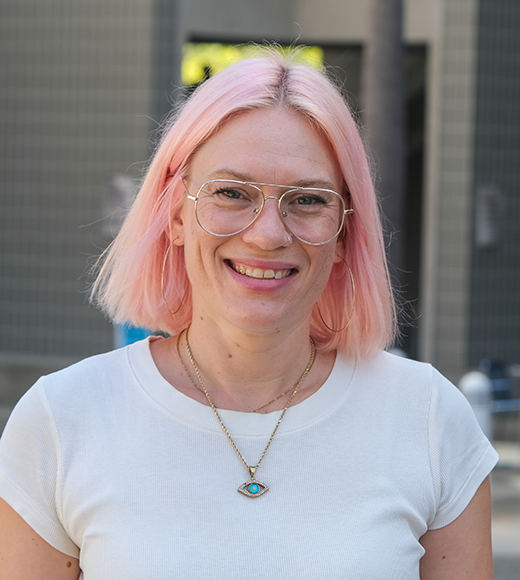Student Q&A: Rachel Castillo, 2L (She/Her)
Rachel Castillo was born and raised in the Mission District of San Francisco. She went to Emerson College in Boston for undergrad before moving to Los Angeles to be famous (see also, waiting tables). She later moved to New York and attended CUNY, receiving a master's degree in applied theater. Then, she worked as a teaching artist, facilitating the creation of original theater with different communities of non-actors, before she became the director of an afterschool and summer program.
At UCI Law, she has participated in ten different pro bono projects and is on the board of a number of student organizations and groups, including Movement Lawyering, NLG, and PILF, and is an SBA student representative on the faculty selection committee. She's committed to pursuing public interest work after graduation and is especially interested in criminal law and the abolition of and alternatives to prison and policing.

Q: What motivated you to pursue a law degree, and why did you choose UCI Law?
I decided to go to law school for a number of reasons. It was in the midst of the pandemic, and I was living in Brooklyn and working as an educator in non-profit settings. I loved the work but at the same time, I found myself constantly exhausted, struggling to make ends meet, and frustrated with the systemic challenges faced by my various communities. I wanted to acquire more tools to participate in building the better world I know is possible. I gravitated towards law because of its versatility and potential to impact change on different levels, from the personal to the systemic. I chose UCI after attending the admitted student weekend. I was drawn to the clinic and pro bono opportunities, but mostly, the students convinced me it was the place for me. They were friendly and kind, and they described the learning environment as welcoming and collaborative. Plus, I wanted to come back home to California and the SoCal sunshine was calling my name.
Q: What has been your proudest accomplishment so far at UCI Law? (or what do you hope to accomplish?)
Getting through 1L! It was definitely one of the hardest things I've done, even at my big age. I'm proud of the moments where I was able to support other students in making the experience more tolerable. I'm also proud of making connections with practicing attorneys and professors who are doing the kind of work I am inspired by. Looking ahead, I'm excited about a pro bono project I'm helping to get started, supporting community members who have experienced police misconduct.
I wanted to acquire more tools to participate in building the better world I know is possible.
- Rachel Castillo, 2L
Q: Can you tell us about a memorable pro bono experience you've had at UCI Law?
All of it was memorable, and it really helped to support my law school journey and my learning. In the first semester of 1L, I focused on client-facing work, which allowed me to connect with the OC community and remind myself why I chose law in the first place. The second semester was more focused on research, and I got the chance to see what movement lawyering could look like in practice. This year, I am student-leading a few projects and staying on with my summer internship supervisor at the public defender's office.
Q: What advice would you give to prospective students who are thinking about going to law school?
I know it's easier said than done but try and find a balance between getting all the information you need, and tuning out the noise. The whole process of applying to law schools is expensive, elitist, challenging, and competitive, and that doesn't change once you're accepted. Even though so many of these experiences are quantified in a number (LSAT score, grades, class ranking), YOU are not a number, and your worth isn't defined by one. I think it's important to think deeply about how you define success and hold on to that when things are difficult. Rejection is hard and is part of the process, but again, it doesn't mean you aren't amazing. I measure success by the quality of the relationships and community I build, and the integrity with which I approach my work. That doesn't mean I don't get stressed about grades or comparing myself to others, but I actively remind myself of why I'm here and who I want to be. Staying grounded is a process, not a destination, and it's up to you to decide what that means for you.
